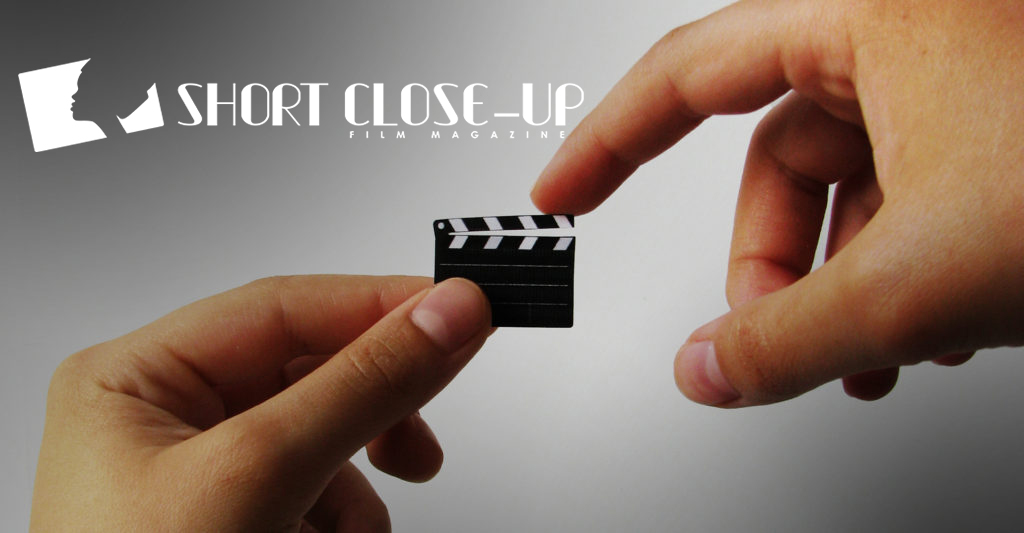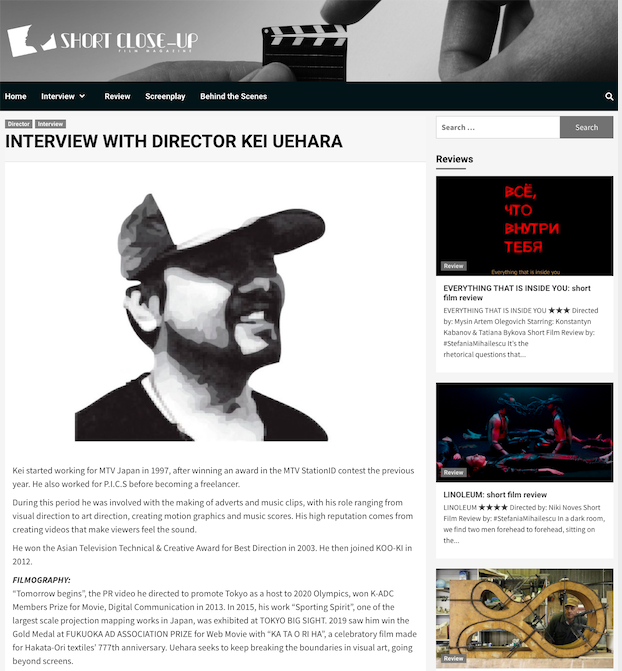
海外メディア「SHORT CLOUSE-UP」にKOO-KI上原のインタビュー記事が掲載されました。
優秀なショートムービーの制作者を紹介する国際的なオンラインマガジン「Short Close-Up」に、KOO-KI上原のインタビュー記事が掲載されました。
上原演出の「かたおりは」が先日「SHORT to the Point」で受賞した事を受けての掲載になります。
INTERVIEW WITH DIRECTOR KEI UEHARA

(記事を一部日本語にて紹介)
●映像制作が、自分にとっての物語を伝える手段なのだと認識するきっかけとなった特定の出来事や時はありますか?
Was there a particular event or time that you recognized that filmmaking is your way of telling stories?
大学でグラフィックデザインを学んでいた時、視点誘導の面白さにハマり、それを突き詰めていった結果「動き」によって視聴者の視点をコントロールし、その変化によって感情とは違う直感的な高揚感を与えられる事に気づいたのが始まりです。
I first got into gaze guidance when I was studying graphic design at university. I was addicted to the fun of it. Pursuing it led me to realize that I can give viewers a different experience, an intuitive sort of euphoria, by controlling their gaze through motion, and that's where it all began.
●映像制作の学校などに行くことは、映像作家として成功するのに必須だと思いますか?
Do you think it is essential to go to a film institute in order to become a successful filmmaker?
映像制作の学校に行くことが必須だとは思いません。もし学校に行けば同じ志の仲間がいる環境にいれる可能性はあるかもしれませんが、 それが必ず成功につながるとは思いません。 私の知る多くの優秀なディレクター達は映像学校とは違うルートでそこにたどり着いています。そういう方のほうが発想が豊かな印象です。 まあ、結局は本人の強い信念があれば、どこ出身であろうともなる人はなる。という所でしょうか。
Not really. If you go to a film institute, chances are that you will be among peers sharing similar ambitions but it doesn’t necessarily mean you’ll succeed. Many wonderful directors I know took different routes to be film directors. My impression is that they are more creative. In the end, it’s up to you to believe in yourself and follow your dreams.
●(映像作家としてキャリアを)始めるのと、ずっと(作家として)続けていくのと、どちらが難しいでしょう? また、始める/続けるために、何か克服しないといけないことはありましたか?
Is it harder to get started or to keep going? What was the particular thing that you had to conquer to do either?
どちらも同じくらい難しいでしょう。 映像を作る上で、アイデアを出す事から完成に至るまで全ての工程は、みんな難しかったり、面倒くさかったり、退屈で地味な作業だったり、そんな事がほとんどです。 克服するという点でいうと、僕の場合はそういった作業を「難しい」「面倒くさい」「退屈」と思わず、完成したときの喜びをイメージして楽しんで作業できる事かと思います。
Both are equally hard. Almost all the processes in filmmaking, from brainstorming ideas to giving finishing touches to the final edit, are either difficult, troublesome or rather boring steps. My trick is to imagine the joy I’d feel after completion instead of thinking how difficult or boring it is at the moment.
●これまで、自分の作りにポジティブな影響を与えた、最も大切な「学び」はなんでしたか? その学びはどのようにして得たものでしょうか。
What was the most important lesson you had to learn that has had a positive effect on your film? How did that lesson happen?
失敗も成功もひっくるめて、人生全てが「学び」です
Everything in life is a lesson, including failures and successes!
●キャスティングから映像の編集まで、妥協しないといけないようなことにはどんなことがありましたか?また、どのようにそれらの妥協や予想外の事態を含めてかじ取りを行い、一貫性のある作品を作りましたか?
What were the production realities from casting through editing that you had to accommodate? How did you navigate those compromises or surprises and still end up with a cohesive film?
映像制作において予算と時間が限られている時点で、全ての面で妥協していると言えます。けど、その制限された中で如何にクリエイティビティを発揮して乗り切るか?というのもディレクターの醍醐味だと思います。予想外の事態でもそれは同じ、ネガティブなアクシデントに対してネガティブにならず、それを味方につけて新たなアイデアを提案して、結果メッセージがブレない様にするのも、楽しみの一つです。
It can be said that I’m making compromises on every aspect due to the set budget and deadline! But it’s also a cool aspect of being a director, figuring out how to use your creativity under many restrictions. The same can be said about surprises and unexpected accidents. Don’t be drawn into negativity in the case of accidents. Overcome them with new ideas, while keeping the film cohesive. It’s part of the fun.
●製作の過程において、(かたおりはについて)一番難しかった芸術的な選択(作家としての選択)にはどういったものがありましたか?製作のどの時点でも構いません。
What was the hardest artistic choice you made in the making of a film, at any stage in production?
「かたおりは」は、基礎となるアイディア自体はすぐに生まれました。 「博多織」という織物が777年もの間、糸を紡ぎ、織り、人から人に伝え続けた、その膨大な繰り返しを、ことばと音楽とダンスがそれぞれループを繰り返し、それが少しずつズレて行く事によって気づきが生まれるというアイデアです。 しかしそれを実現させるには音楽、ダンス、映像、全てにおいて細かな計算が必要だったのもわかっていました。 そういった意味では短い製作期間の中で振付師に康本雅子(やすもとまさこ)作曲に中村優一(なかむらゆういち)が起用できた事が非常に大きかった。康本さんは以前から注目していた振付師で今回のトーンに必ず合う確信があったので忙しい彼女のスケジュールが合った事が幸運でした。中村さんは以前から一緒に作っている仲間で彼のスタイルも熟知しているので今回のトーンには欠かせない事はわかっていました。 今回この2人が起用できた事により、当初私が想像していたモノよりさらに表現が広がり、作品の完成へと繋がったと思います。
Talking about “Ka Ta O Ri Ha”, the basic ideas came to me rather right away. For 777 years Hakata-ori weave has been passed down from person to person . It’s a huge repetition of spinning yarns and weaving. The loop of words, music and choreography represents them, and by slowly making them go off the loop, it brings new awareness-that was the idea. But I also knew that it’d require much calculation on and between everything from music to dance as well as the filming itself. It was very fortunate that I could work with Masako Yasumoto, the choreographer and Yuichi Nakamura, the composer in such a tight production schedule, they played a big part. I’ve been interested in Masako’s choreography for some time, and was convinced that her style would fit for this project. It’s fortunate that she made time for us out of her busy schedule. Yuichi is my long time buddy and I’m very familiar with his style, and I knew that he would be essential to the tone of the film. Their presence broadened the horizon far more than I expected, leading to completion of the film.
●監督はコラボレートをしてきていますね。どのようにチームメイトとであい、彼らとの関係を良好に保っていますか?
You are a collaborator. How have you discovered members of your team and how do you keep the relationship with them strong?
チームメイトとの関係を良好に保つには、一番は監督である私自身が、関わる作品に対して現場にいる他の誰よりも楽しんでいる事、そうでなければ何が原因か、自分と正直に向き合い、それを周りに伝える事 。
To keep the relationship healthy and strong with any teammates I, the director, need to be the person who’s most excited about that filmmaking. The happiest one to be there. And if I'm not, I’ll be honest with myself and search for the cause, then tell the others about it.
●オーディエンスが求めるのはどういったことでしょうか?また、彼らが求めるものについて、映像作家は心配をするべきなのでしょうか?
What do audiences want? And is it the filmmaker’s role to worry about that?
基本的には作品と観客とのコミュニケーションだと思います。監督が心配すべきなのは伝えたいメッセージや感情を映像言語として観客にどう届けるか。的確に伝えるために、様々にスタイルを変えて、あるときは威圧的に、あるときは子供じみてみたり、と。様々なスタイルを変えてより響く為に何が必要かを常に考えなくてはならないと思います。
I believe it's communication that the audience wants- communication between the film and the audience. So what you need to worry about is how to deliver the messages and feelings that you want to convey. Try various styles, sometimes you need to be bossy or childish to hit the mark. You always need to think of how to make t he message resonate.
●フィルムフェスはあなたの人生においてどんな役割を果たしてきましたか?フィルムフェスは必要なのでしょうか? どのようにフィルムフェスを最大限利用していますか?
What role have film festivals played in your life so far? Why are they necessary? How do you get the most out of them?
フィルムフェスは自分の作品を様々な人達に見てもらえる非常に良い機会だと思います。 フィルムフェスに出すために作品を作る事はありませんが、人前にモノを出す以上、フィルムフェスに出品するということは自分の作品が見られて評価をされること。なので、評価を得られるというのはとても良いモチベーションを貰えますがフィルムフェスに出すために作品を作る事はありません。
Festivals are great opportunities to get your films seen by various people, and submitting them to the festivals means not only will your work will be seen, but also evaluated. It motivates me pretty well when my work is recognized, but I don’t make films just for festivals.
●映像作家というのは、独自色があって斬新であるべきなのか、それとも古典的だけれど安全なスタイルをとるべきだと思いますか?
Do you believe that a filmmaker should be original and fresh or he/she should stick to classic but safe cinema style?
両方必要だと思います。独自性があって斬新な表現は常に仕掛けていかなければならないとは思います、それを引き立たすためにあえて古典的なスタイルを取りいれる事もあります。 まあ、そういった意味でも、そもそも映像を見るのが好き。というのがこの仕事を続けていく上で大事だと思います。
To be able to being both original and classic is necessary for filmmakers. Original and fresh are what I always strive for, and sometimes it helps to throw in classical taste in-between to make the originality shine. Above all else, that you very simply love watching films is the most important characteristic to keep being a filmmaker if you ask me.